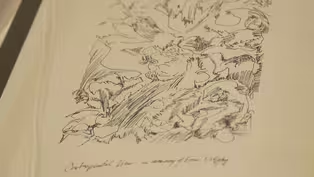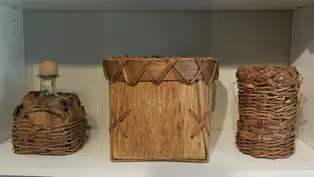State of the Arts
Westphalia
Clip: Season 42 Episode 3 | 6m 30sVideo has Closed Captions
West Orange's Luna Stage puts on Westphalia, an new play about citizenship and AI.
As the experimental theatre scene struggles to recover post-COVID, West Orange's Luna Stage puts on Westphalia, an ambitious new play about citizenship and AI from playwright Helen Banner and director Lila Rachel Becker.
Problems playing video? | Closed Captioning Feedback
Problems playing video? | Closed Captioning Feedback
State of the Arts is a local public television program presented by NJ PBS
State of the Arts
Westphalia
Clip: Season 42 Episode 3 | 6m 30sVideo has Closed Captions
As the experimental theatre scene struggles to recover post-COVID, West Orange's Luna Stage puts on Westphalia, an ambitious new play about citizenship and AI from playwright Helen Banner and director Lila Rachel Becker.
Problems playing video? | Closed Captioning Feedback
How to Watch State of the Arts
State of the Arts is available to stream on pbs.org and the free PBS App, available on iPhone, Apple TV, Android TV, Android smartphones, Amazon Fire TV, Amazon Fire Tablet, Roku, Samsung Smart TV, and Vizio.
Providing Support for PBS.org
Learn Moreabout PBS online sponsorshipBanner: Being a writer in the 2020s, you are taking a viewpoint on how optimistic or how pessimistic you are.
It may be that only 30% of any audience is going to like your work, and that feels really good to go for that, to be, like, something that people will have a strong reaction to.
So, this started years ago as a Channel Islander.
I grew up in this offshore-financial environment where global wealth was using this tiny island to protect its assets.
Patriotism, for me, is very different, because when I say where I'm from, I'm from Jersey, which is this 9-by-5-mile island.
It's tiny, but it is an identity as complete as if I say I'm from a more regular nation-state.
So I think it set me off always on a path to be a little bit more of an outsider looking in at the experiences of citizenship.
I decided I had to write a play, that, otherwise, it wasn't going to happen, and I needed to be a playwright.
It's so essential to your identity to feel that you can do this thing that is going to consume you.
I wrote the play really, really quickly over the holidays at the end of last year.
It was a really fast process, I think the fastest process I've ever been involved in.
Becker: You mentioned this play about borders and robots and capitalism, and I was very intrigued.
We met over Zoom and we talked about it, and you had, like, a whole play in your head.
And I think you mentioned you would -- you know, you would write some scenes and send them to me.
And then you wrote a full -- You wrote, like, the first act of the play.
Banner: It's a big request when you ask someone to direct your play.
You should really say like, "I'm just going to take over your life for a year."
I think making theater is extraordinarily difficult, but Luna Stage has this amazing reputation as a new-play development hub, and they're like gold dust at the moment because so many things are pulling back and retrenching.
Becker: The theater industry is really struggling in this moment, and the biggest loss has been in the places that develop new work.
Banner: And, like, we've had to take that into our lives.
Becker: So, we spent many hours from September of 2022 to July of 2023 just reading the play back and forth.
"Westphalia" takes place in a world where you can buy and sell your citizenship on a global market like the stock market.
And a family comes to Cit-Ex, the corporation, that manages this on behalf of the U.S. government, and they're kind of at the end of their rope, financially, because they've become deep in debt.
Banner: How would it feel to have $2 million in your bank account this afternoon, though?
Becker: That would feel amazing.
Banner: Capital that won't be taxed.
Capital you can take anywhere in the world.
Because I can sell you a citizenship in most places of the world.
Kris: Maybe citizenship sales are a way of breaking down the old order.
Banner: If there is, like, a core message that I wanted the play to have, it was the essential kind of abstract absurdity of borders, that they are a totally constructed element of our world.
Becker: Every play is its own world, and you have to figure out the rules of the world.
Like, how do you create this world onstage?
[ Drilling, whirring, pounding ] So, the actors wanted to know, like, how does this system work?
What does citizenship sales like?
What would this look like if it went well?
Lots of questions about like, how does this world function?
Kris: I make this pronunciation freely, without any mental reservations or purpose of evasion.
Becker: And then it doesn't.
Banner: I'm not a playwright who knows my ending immediately.
And so the most stress, I think, came, for me, in making sure the final act was where I wanted it to be.
Becker: That was the last piece of the puzzle to settle in, and I feel like it's still -- it's still settling.
Banner: There's normally a lovely moment where we both sit down in the back row and watch.
Becker: And no one can look at us, yeah.
Banner: Opening was great.
Seeing an audience come in and thinking a lot about it and coming out and saying good things, I think it's magical.
-Let's don't get caught.
-The... Leandra: How would it feel to have $2 million in your bank account this afternoon, now?
Edward: [ Chuckles ] That would feel -- That would feel amazing.
Leandra: Capital that won't be taxed.
Capital you could take anywhere in the world.
Where would you like to be a citizen of?
Banner: The whole point of writing a play is an act of communication with the audience.
And so you are thinking very clearly like, "How will this story connect?
Kultur 1: What's that in your hand there?
Kris: Well, I wouldn't assume this is literally me.
Kultur 1: It looks like you.
Banner: The work we're doing is writing and processing and defining this decade.
[ Applause ]
Judith K. Brodsky: A Force in the Arts
Video has Closed Captions
Clip: S42 Ep3 | 9m 56s | We meet artist, scholar, print maker and feminist pioneer, Judith Brodsky. (9m 56s)
The Wild Baskets of Steven R. Carty
Video has Closed Captions
Clip: S42 Ep3 | 7m 4s | Steven R. Carty is a second-generation basketmaker from the South Jersey Pinelands. (7m 4s)
Providing Support for PBS.org
Learn Moreabout PBS online sponsorshipSupport for PBS provided by:
State of the Arts is a local public television program presented by NJ PBS













